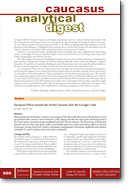Can Georgia Become a Multiparty Democracy?

Author(s): Cory Welt
Editor(s): Robert Orttung
Series: Caucasus Analytical Digest (CAD)
Issue: 43
Pages: 13-15
Publisher(s): Center for Security Studies (CSS), ETH Zurich; Research Centre for East European Studies, University of Bremen; Institute for European, Russian and Eurasian Studies, George Washington University
Publication Year: 2012
